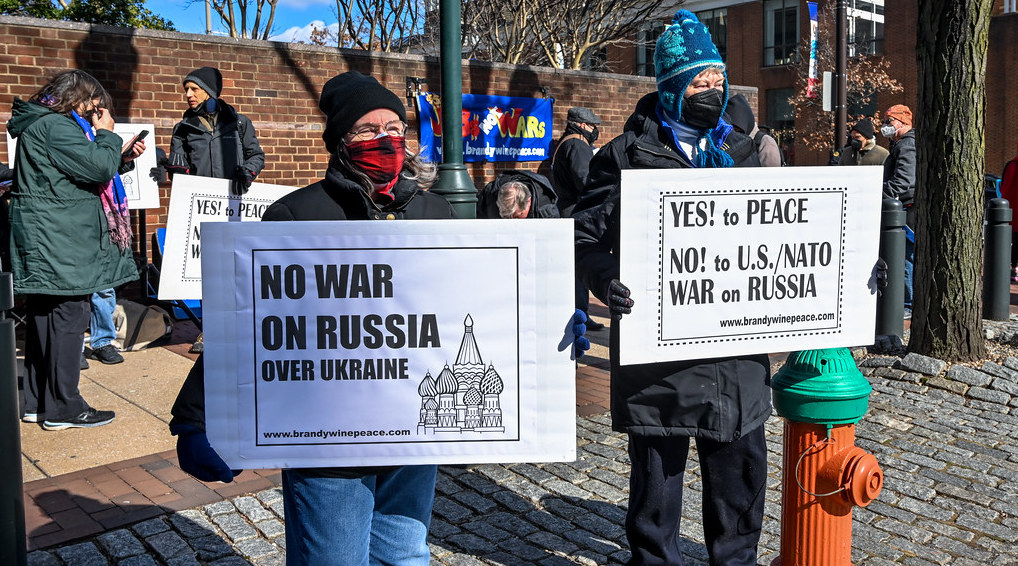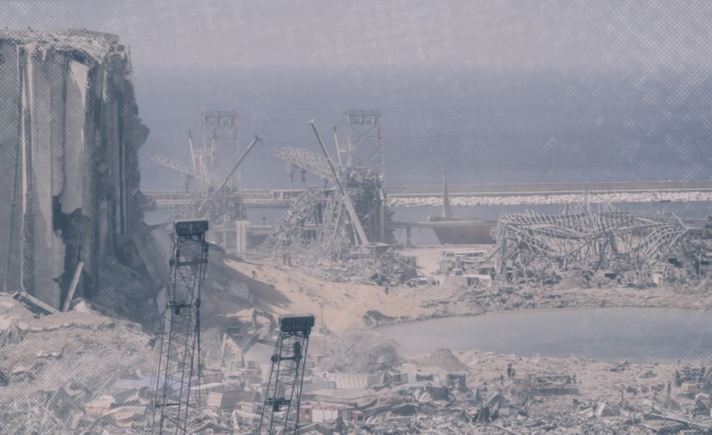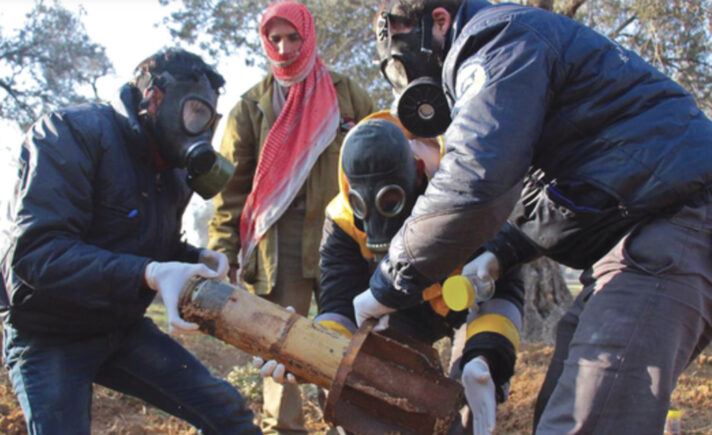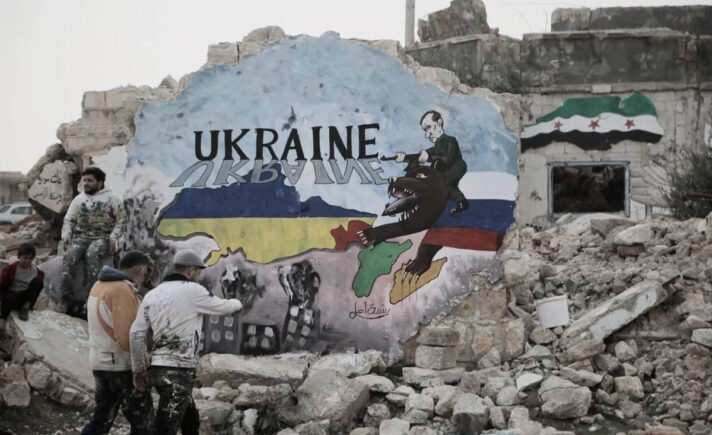Statements made by María Jamardo,a radical Galician journalist, on the bombing of Gernika by the Nazi’s in 1937 in a Telecinco Program
This Stalibanian argumentation – reproduced through tweets over the last few days – is one of many protean machinations, some smarter, others blunter, employed by the left shamelessly cloning the Russian aggressor’s propaganda. It is not that they are unaware that propaganda of an invading power should be taken with a grain of salt; it’s a critical engagement they are used to, and rightly so, when the invader in question happened to be the US or NATO. Murderers’ words lack credibility, that we know; if I want to believe in his words, inevitably, I need to exculpate or attenuate his participation in the crime. In order to trust in Russian propaganda as the American one before it, it is necessary to invert the victim/victimizer relationship and to attribute all responsibility for what is happening to the bombed. If we prove that the Ukrainians, puppets of NATO and the US, are to blame, then we can believe and repeat what the Kremlin says with a clear conscience. This role reversal, of remarkable ethical infamy, is the propagandistic norm of imperial aggressions, and we criticized it in both Iraq and Afghanistan. Today, many leftists succumb to this norm, who, between denialism and supposed contextualization, do not hesitate to juxtapose mainstream pro-Ukrainian thinking with mainstream pro-invasion propaganda. The Bucha massacres triggered severe delusions. Journalists on the ground – people like Alberto Sicilia, Hibai Arbide or Mikel Ayestaran – have been scolded for taking survivors’ testimonies seriously and not talking about “alleged war crimes”, a judicial caution that, in fact, some would like to extend to the war itself: “alleged” Russian invasion, “alleged” shelling of Ukraine, “alleged” siege of Mariupol. Russia cannot possibly be the perpetrator of the crimes attributed to it because it is, in the end, a victim; perhaps even the victim, of enemy propaganda. Fine analysts and foolish pamphleteers, politicians masquerading as journalists and crackpot Stalibanists, share this factual horizon, the matrix of all their discursive similarities: if Russia invades Ukraine, it is really the US that invades Ukraine; if Russia bombs Ukraine, it is really the NATO that bombs Ukraine. What is actually happening is always a perverse opposite of what happens. Denialism cannot be confined to the Bucha massacres. It’s the other way around, the Bucha massacres can be denied because the very possibility of Putin’s aggression and, therefore, its consequences, are denied in principio. If it were not so tragic, it would be heartwarming to see so many adults, sometimes sensible, sometimes even friends, swept away by this infantile urge to believe in the goodness, or at least the legitimacy, of “our” favorite criminal.
And why “ours”? They assail us like Cold War gloom. Some, even younger generations, succumb to the illusion because, despite his alliances with the extreme international right, despite his declarations against Lenin, they see a continuum between Putin and the Bolshevik revolution. There is a Soviet ember in the anti-system rebelliousness of a certain left, as there is an ember of Francoist nostalgia
This role reversal (between victims and victimizers) usually employs two cognitive expedients: one is geopolitical fatalism; geopolitics reduced to realpolitik. The other is moral historicism; history conceived as a war against evil. The latter is the one that, from the left side, reproduces Jamardo’s phrase: admitting that Ukraine was indeed bombarded (which, to them, is yet to be proven), necessitates framing Ukraine as deserving of this calamity due to its rapprochement to the EU, NATO and the U.S.: Ukrainians are not as good as they seem; they are not as good as the media portrays them. Suddenly, the same left that, with good reason, tentatively set aside Saddam Hussein’s bloody dictatorship to condemn, with even more reason, the U.S. invasion of Iraq, is now becoming casuistic and nitpicky. It is has become necessary to know whether and to what extent Ukraine is a democracy, to go through Zelensky’s biography with a keen eye, to denounce every Nazi group and to be very sensitive – while justifying or silencing the tyranny of the Baath in Syria – in the face of the otherwise unjustifiable suspension of some political parties in Ukraine. One must be morally intolerant of the unforgivable, but isolated, war crimes of the Ukrainian army while Russian massacres, Russian bombings and Russia’s own invasion of Ukraine are considered “alleged”.
This casuistic criminalization of the victim is usually inscribed in a geopolitical fatalism summed up in a thought that, even in the most well reasoned and well documented texts, more or less assumes this formula: “That’s what happens when you stick your finger in the eye of the old Russian Bear”. The same left that considers it legitimate and even imperative for Latin America to free itself from the traditional American yoke, the same left which denounced the Bay of Pigs and celebrated the Cuban victory, the same left which is justifiably indignant with every change of government rigged by Washington, accepts as a dictate of realpolitik the right of Russia to have its own “backyard”. A kind of mechanical fatalism forces us to take into account the consequences of sticking one’s finger in the eye of the Bear, who cannot avoid using its paws, all while revolutionarily piercing old Uncle Sam’s hat and plucking the American Eagle. To stick one’s finger in the Bear’s eye is reprehensible; to pluck a feather from the Eagle’s breast is commendable, legitimate, necessary, and celebratory. As a consequence of a combination of these two logics – geopolitical fatalism and moral historicism – this sector of the left never waits for the facts because it never expects history to produce any facts: it knows beforehand which peoples act spontaneously and which are being manipulated by NATO and the U.S.; and it decides, therefore, which peoples have the right to rebel against tyranny, national or foreign, and which must submit to the necessities of the struggle against Yankee imperialism. In this way, it decrees in advance that facts in Ukraine – the massacre of Bucha, for example – is Ukrainian propaganda, while Russian propaganda, in the mirror, is an indisputable fact. The invader is the real victim and does not lie; and that is why we replicate and disseminate his versions with the mystical fruition of the one who, against the rheum of “dominant thought”, has a direct and privileged access to the truth.
There is also substantial elitism in this Staliban left, that likes to be in the right against common sense and the common of us remaining mortals, trapped in the guts of the system, blind and meek. An elitism which, in spirit, is the very same which, against the “system”, stood amongst the denialists and anti-vaccine activists during the pandemic. They may be not so strange bedfellows after all, both the right and left, Javier Couso and César Vidal, Iker Jiménez and Beatriz Talegón,
Geopolitical fatalism and paranoid elitism, mixed sources of the same syndrome, end up denying others autonomy, will and the capacity for agency. They, who “know”, can do nothing; others, who do something, are purely pawns of evil on the geostrategic chessboard. They thus inscribe their permanent negative rumination in a context from which politics is absent. And they resign themselves to delegate their impotent reason to the surrogate action of any power destructive enough to disrupt the established world order. This way, the same leftists who defend, at the local level, the right to sovereignty, deny it at the international level to Ukrainians, who are asked, in the name of pacifism, to surrender to the power of the strongest, provided it is not American. Western-centric anti-Westernism is suspicious of any will for emancipation that does not pass through the anti-imperialist molds of the old left, which continue to think of the world, as Marx said of Don Quixote, to the measure of an order that no longer exists. This has already happened in Syria, as explained by Yassin al-Haj Saleh, one of our greatest intellectuals, a communist, imprisoned for sixteen years in the jails of the dictatorship, in an extraordinary article in which he even criticizes the position of the much admired Chomsky for his ethnocentric blindness. The obsession with the U.S. in a disordered world, in which evil has become fragmented, decentralized and emancipated from the U.S. monopoly, rightly points out, for example, the power of NATO, but undervalues as subordinate, subsidiary or harmless other dangers -for democracy and the freedom of peoples- that determine the individual and collective destiny of a good part of the planet. Chosmky, of course, has no illusions about Putin; quite the contrary. But his anti-American neurosis led him to abandon in Syria those who gambled and, in many cases, lost their lives fighting against the dictatorship, and fed into the thesis that in Ukraine, Russian invasion is, somehow, an automatic response to NATO’s encirclement.
We contextualize, contextualize and contextualize; and we suspect, suspect and suspect And by contextualizing and suspecting ad infinitum, we dissolve Russian responsibility into a perpetual war between equivalent evils, a magmatic inter-imperialist conflict, an impersonal capitalist crisis, a “natural” consequence of civilizational decline, etc. We become so preoccupied with history and “structures” that we disappear into it Putin’s decision to invade a sovereign country and generate thousands of deaths and millions of refugees. If it made any sense to invoke international legality against the invasion of Iraq, it also makes sense to invoke it against the invasion of Ukraine; if it still makes sense to distinguish between negotiations, pressure, sanctions and military aggression, it makes sense to denounce Putin’s Russia as solely responsible for a new situation in which world peace and planetary survival, along with the lives of Ukrainians and Russians, are tragically endangered. Any reason Putin might have had against NATO was left behind from the very moment his army crossed the Ukrainian border and, with it, the line separating a geopolitical move from armed aggression. There are no automatisms in history. NATO is responsible for having mismanaged victory in the Cold War era, just as European powers mismanaged the defeat of Germany in World War I. But Ukrainians are not victims of NATO, just as the Jews were not victims of the Versailles Treaty. Even more: as terrible as it may sound, Putin has shown that there is currently no alternative to NATO. The European left should be thinking about proposals in this regard for the future instead of preaching a pacifism that makes a lot of sense in Russia, against its government’s decision to wage war, but which in Ukraine is synonymous with subjugation and surrender. The Ukrainians have decided not to surrender and no one, it seems to me, should reproach them for it.
The left is losing not only the opportunity to sympathize, against Vox
Here lies the paradox: an invasion has turned into war, thanks to Ukrainian resistance. It is a war of independence. It is of utmost priority to prevent this war from involving NATO; it is of utmost priority to support, to defend, to ensure the independence of Ukraine. Our warmongering must be limited by the need to avoid international conflict and nuclear confrontation; our pacifism by the need to affirm justice and international law. That is the dilemma, I think, that the left should be arguing about, not whether or not to applaud Zelensky in Parliament, or whether the Azov battalion is all Nazis or has anarchist elements. Most certainly not – for God’s sake – about whether the survivors of Bucha are lying or telling the truth. The dilemma is so great, it is so full of dangers and uncertainties, it requires, by all means, all our intelligence and serenity, that we should not become guilty of blurring the one thing that the left, like everyone else, should be certain about: who are the aggrieved and who is the aggressor? Who do we owe our support – at least mentally – and who do we have to condemn?





